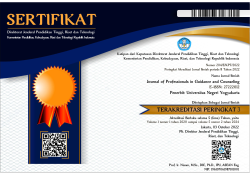Copyright Notice
The copyright of any article in ProGCouns: Journal of Professionals in Guidance and Counseling is fully held by the author under the Creative Commons CC BY license.
- The copyright on each article belongs to the author.
- The authors retain all of their rights to the published work, not limited to the rights set out on this page.
- The author acknowledges that ProGCouns: Journal of Professionals in Guidance and Counseling was the first to publish under a Creative Commons Attribution 4.0 International (CC BY) license.
- Authors may submit articles separately, arrange for non-exclusive distribution of manuscripts that have been published in this journal into other versions (eg sent to the author's institution respository, publication into books, etc.), acknowledging that the manuscript has been published for the first time in ProGCouns: Journal of Professionals in Guidance and Counseling;
- The author warrants that the original article, written by the author mentioned, has not been previously published, does not contain any unlawful statements, does not violate the rights of others, is subject to copyright which is exclusively held by the author.
- If an article is co-prepared by more than one author, each author submitting a manuscript warrants that he or she has been authorized by all co-authors to agree to the copyright and license notice (agreement) on their behalf, and agrees to notify the co-authors of the terms of this policy. ProGCouns: Journal of Professionals in Guidance and Counseling will not be held liable for anything that may arise due to the authors' internal disputes.
Licence :
ProGCouns: Journal of Professionals in Guidance and Counseling is published under the terms of the Creative Commons Attribution 4.0 International License (CC BY). This license permits anyone to:.
- Sharing — copying and redistributing this material in any form or format;
- Adaptation — compose, modify, and create derivatives of this material for any purpose.
Licence :
-
Attribution — You must give appropriate credit, provide a link to the license, and indicate if changes were made. You may do so in any reasonable manner, but not in any way that suggests the licensor endorses you or your use.
- No additional restrictions — You may not apply legal terms or technological measures that legally restrict others from doing anything the license permits.















